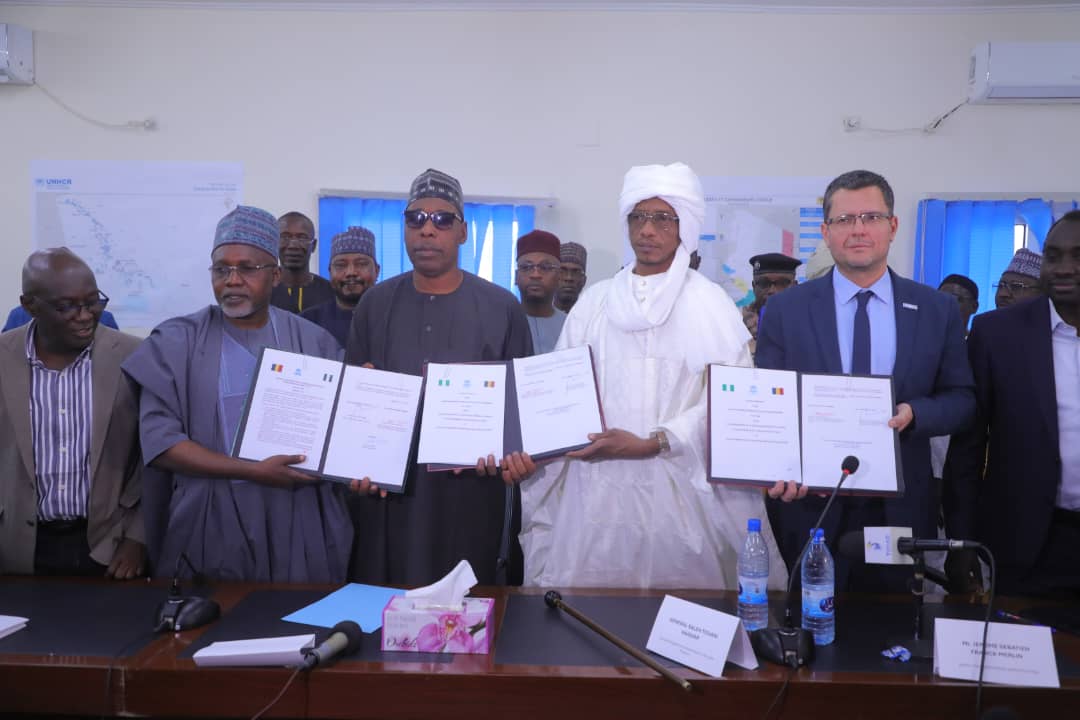
By Adeyemi Adekunle
Borno State Governor Babagana Zulum has led a high-profile Nigerian delegation to Chad to repatriate 7,790 refugees who fled their homes nearly a decade ago. The refugees, predominantly from Borno State, had been living in Baga Sola, a town in Chad’s Lac Province, after escaping the violence that ravaged the Lake Chad Basin region.
The repatriation process, which officially commenced this week, marks the first phase of a broader plan to bring back Nigerian refugees scattered across neighboring countries. A total of 1,768 families will be returning home in this initial stage. The effort is being carried out under a tripartite agreement between Nigeria, Chad, and the United Nations High Commissioner for Refugees (UNHCR), ensuring that all returning refugees do so voluntarily and with adequate support to reintegrate into their communities.
Governor Zulum’s delegation included Dr. Yusuf Sununu, Nigeria’s Minister of Humanitarian Affairs, and Tijani Ahmed, the Federal Commissioner and CEO of the National Commission for Refugees, Migrants, and Internally Displaced Persons. Upon arrival in Baga Sola, the delegation was warmly received by Governor Saleh Tidjani of Chad’s Lac Province, who reaffirmed Chad’s commitment to ensuring a smooth transition for the returning refugees.
During the formal repatriation launch, Zulum acknowledged the resilience of the displaced families and reassured them of the Nigerian government’s commitment to their well-being upon return. He emphasized that repatriation would only be carried out for those who voluntarily agreed to return, adding that necessary security and resettlement measures had been put in place.
“We are here not only to bring our people back home but to assure them that the government is ready to support them in rebuilding their lives. We appreciate the government and people of Chad for their generosity in hosting our citizens during these difficult years,” Zulum said.
Chad has been one of the key host nations for Nigerian refugees fleeing the insurgency, providing shelter and humanitarian aid for thousands despite facing its own economic and security challenges. The cooperation between both nations in managing the crisis has been instrumental in ensuring that displaced persons receive the necessary care and protection while in exile.
Minister Sununu commended Governor Zulum for his hands-on leadership in tackling the humanitarian crisis, describing him as a role model in crisis management. “Governor Zulum has demonstrated remarkable dedication in addressing the plight of displaced persons. His collaborative approach with the federal government and international partners is commendable,” Sununu stated.
The returnees are expected to be resettled in various communities across Borno State, with the government promising continued assistance to help them reintegrate. As part of the rehabilitation process, they will receive food supplies, healthcare, and access to education and vocational training to help them regain their independence.
Security remains a major concern in the repatriation process, given the persistent threats posed by Boko Haram and other extremist groups in the region. The Nigerian government has assured returning refugees that adequate security measures have been taken, including increased military presence in resettlement areas and strengthened community policing initiatives.
The decision to repatriate the refugees comes amid broader efforts by Nigeria to address the long-term effects of displacement caused by insurgency and conflict. Over the past decade, millions of Nigerians have been forced to flee their homes, with many seeking refuge in Chad, Cameroon, and Niger. While some have integrated into host communities, others remain in refugee camps, waiting for an opportunity to return home safely.
The tripartite agreement signed with Chad and UNHCR is expected to facilitate a structured and humane return process. Under the agreement, returnees will receive assistance to rebuild their lives, and the Nigerian government has pledged to prioritize their welfare. However, challenges remain, including the need for sustainable housing, economic opportunities, and psychological support for those who have endured years of displacement.
The repatriation effort is a crucial milestone, but experts warn that ensuring long-term stability and security in Borno and other conflict-affected areas will require sustained commitment from the government and its partners. Humanitarian organizations have emphasized the need for continued investment in education, healthcare, and economic development to prevent a relapse into displacement.
For the thousands of refugees returning from Chad, the journey home is both a relief and a new challenge. Many will find their hometowns changed, with some communities still struggling to rebuild from the devastation of insurgency. Yet, the hope of starting afresh in their homeland offers a renewed sense of belonging and a chance to reclaim the lives they were forced to abandon.
As the first batch of returnees makes its way back to Nigeria, the success of this repatriation effort will be closely watched, not only by those still waiting to return but also by the international community, which continues to support Nigeria’s efforts in addressing one of Africa’s most protracted displacement crises.




